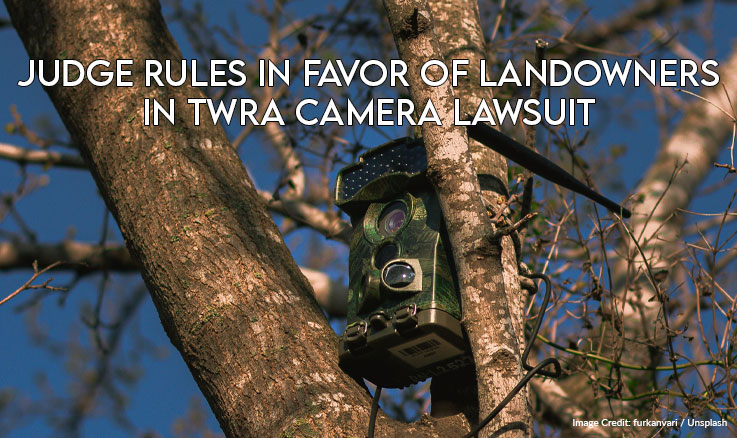Image Credit: furkanvari / Unsplash
The Tennessee Conservative [By Paula Gomes] –
The Benton County Circuit Court has ruled in favor of two landowners who found Tennessee Wildlife Resources Agency (TWRA) cameras on their property. Hunter Hollingsworth and Terry Rainwaters sued TWRA and some of its employees over privacy rights.
TWRA must now obtain a search warrant before going on private property, something they say will make their job more difficult and increase wildlife crime.
TWRA Director of Communications Emily Buck said, “Our issues are often very time-sensitive, so if someone is hunting game illegally, they’re going to be gone by the time we obtain that search warrant.”

While Hollingsworth has been charged with poaching violations in the past, something he regrets, he said the installation of cameras went too far.
“Cameras are absolutely over the line because you’re being watched 24 hours a day, seven days a week,” Hollingsworth said. “You’re being seen doing things that could be private.”
Rainwaters has a clean record regarding wildlife violations but his son, along with some of his friends, lost hunting privileges and were fined over illegal baiting of waterfowl on a TWRA owned and managed Wildlife Management Area in Benton County in 2017.
“I haven’t been doing anything illegal, so why should they be spying on my land?” asked Rainwaters.
Attorneys for the pair argued that other law enforcement cannot enter without a search warrant and questioned why TWRA are immune.
“The Tennessee Constitution was designed so that law enforcement have to go through certain procedures to do their jobs,” Institute for Justice attorney Josh Windham said. “We don’t live in a country and we don’t live in a state in Tennessee where police just get to do whatever they want because it’s efficient or it would make their lives easier.”
Hollingsworth discovered the camera on his property while driving around one morning in January 2018. He noticed something shining in a tree and stopped to investigate. A Camden resident (population 4,000) his whole life, Hollingsworth who has been hunting as long as he can remember took the camera down and put it in his gun safe. Later that year, in the fall, law enforcement knocked on his door with a search warrant looking for what they claimed was stolen property.
Officers in bulletproof vests handcuffed Hollingsworth and searched his house but he wasn’t taken to jail or given a citation at that time. Instead, months later, he was charged with several violations that included illegal baiting and theft of government property. He lost his hunting license for three years in exchange for a plea deal that dropped most of the charges.
Hollingsworth then filed a lawsuit that challenged the constitutionality of the cameras on his property. That lawsuit was thrown out of a federal court before non-profit, public law firm Institute for Justice got involved.

Through word of mouth in his small community, Hollingsworth discovered that one of his neighbors, Terry Rainwater, had also found two cameras on his property, one of which was pointed at his shop in his house.
Two months after Rainwaters’ son and friends were charged in Operation Bird Dog, an officer entered Rainwaters’ land by boat and installed the cameras. Rainwater had a tenant renting out his home on his property at the time.
The TWRA and U.S. Fish & Wildlife were allowed to install the cameras because of the Open Fields Doctrine. The federal doctrine clarifies that the protections of the fourth amendment do not extend to “the open fields.”
However, Tennessee’s state constitution is slightly different, protecting persons, houses, papers, and possessions from unreasonable searches and seizures. That one word difference was the basis for a successful lawsuit against the TWRA where Rainwaters and Hollingsworth asked for a grand total of $1 in damages.
The pair say it was never about money.

About the Author: Paula Gomes is a Tennessee resident and reporter for The Tennessee Conservative. You can reach Paula at paula@tennesseeconservativenews.com.



4 Responses
Wow, now wildlife protection is becoming a over reach on private property. Wildlife should be protected but why not just ask property owners and have a signed permission?
This is one more instance of a citizen losing a constitutional right, because law enforcement wants to make its job easier.
If you are previously convicted of a crime as relates to wildlife, then Officials should have the right to monitor your wildlife
activities, even on private property. Breaking the law, even on private property should be prosecuted. You have the right to be free from illegal searches in the privacy of your home, but the land you own should not be excluded if you have shown to be non-trustworthy in following the law about wildlife and hunting.
Perhaps in the lawsuit Terry should have been awarded 5 minutes alone in a room with the TWRA official who illegally put the cameras on his property. Whatever happened during those five minutes would be considered as “educational instruction.”